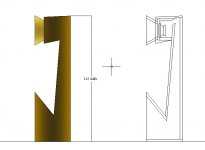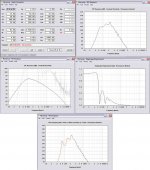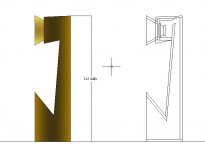This driver seems to model exceptionally well in a rather small horn design. http://www.mcmelectronics.com/product/GALAXY-AUDIO-S5N-8-/55-1906. Here's my drawing.
Attachments
brsanko said:Well I guess I don't know what that means.
Check out GM's post here: http://www.diyaudio.com/forums/showthread.php?postid=1643579#post1643579
GM said:Your link appears to be no good, but if you mean this one, then based on some measured specs it's HF mass corner is much too high for me, though some of the Lowther folks don't seem to mind such high acoustic XOs.
GM
Yes that's the one.
FWIW, it's ~403 Hz with the measured specs I have. BTW, Qts is the most correct value to use for calculating the mass corners and what sealed, ported box design is based on, but for horns we're mostly interested in a driver's effective motor strength, which is Qes.
Since the majority of the math side of my design knowledge was 'distilled' by the pioneers of audio, Altec and later, Prof. Leach, I wasn't aware of Keele's formulas until they cropped up on the Sound Practices list (AKA joelist), so never having compared the two, not sure if there's any audible difference with typical point source drivers meant for simple box loading, though for horn drivers (low Qms) such as the Galaxy, there's enough of a difference that AFAIK a person would have to be tone deaf to phasing issues not to hear it.
GM
Since the majority of the math side of my design knowledge was 'distilled' by the pioneers of audio, Altec and later, Prof. Leach, I wasn't aware of Keele's formulas until they cropped up on the Sound Practices list (AKA joelist), so never having compared the two, not sure if there's any audible difference with typical point source drivers meant for simple box loading, though for horn drivers (low Qms) such as the Galaxy, there's enough of a difference that AFAIK a person would have to be tone deaf to phasing issues not to hear it.
GM
could you tell me in simple terms what effect that would have on the sound. I plan on reading up on this but I haven't been feeling good and have a pounding headache at the moment so I'm not really in the mood to do a bunch of reading. Don't mean to be a PITA but I would appreciate it alot.
Hope you get to feeling better, I suffer from migraines that can immobilize me, so 'feel your pain'. 🙁
Anyway, if you design the BLH to cover the driver's rising response BW, then the higher the mass corner is the longer the horn's path-length must be for a given Fc and at some point the time lag between the horn's and driver's output becomes audible, 'smearing' their overlapping BW (acoustic XO).
Different folks have different thresholds for noticing and/or find this time 'smear' irritating, but a good rule-of-thumb (ROT) is to have the acoustic XO no higher than ~250-400 Hz depending on how sensitive the listeners are to it, ergo ideally its effective mass corner will be the same. Since I fall into the < ~250 Hz group, this driver is unacceptable to me and if you have a variety of listeners, then best IMO to err on the low side of caution when choosing an effective mass corner.
It's this latter criteria that gets many folks into trouble, i.e. they design a BLH based on its T/S specs, then drive it with a high output impedance that's significantly increased Qes, lowering the mass corner, so the whole horn is now too small.
GM
Anyway, if you design the BLH to cover the driver's rising response BW, then the higher the mass corner is the longer the horn's path-length must be for a given Fc and at some point the time lag between the horn's and driver's output becomes audible, 'smearing' their overlapping BW (acoustic XO).
Different folks have different thresholds for noticing and/or find this time 'smear' irritating, but a good rule-of-thumb (ROT) is to have the acoustic XO no higher than ~250-400 Hz depending on how sensitive the listeners are to it, ergo ideally its effective mass corner will be the same. Since I fall into the < ~250 Hz group, this driver is unacceptable to me and if you have a variety of listeners, then best IMO to err on the low side of caution when choosing an effective mass corner.
It's this latter criteria that gets many folks into trouble, i.e. they design a BLH based on its T/S specs, then drive it with a high output impedance that's significantly increased Qes, lowering the mass corner, so the whole horn is now too small.

GM
I haven't inputted your design or messed with the CH option yet, but the deep notch appears to be at ~400 Hz in the shadow response plot.
GM
GM
Ok I see what you mean. I guess I haven't listened to any designs with the crossover that high so I have no idea if it would bother me or not. It's just such a small easy to build design it's so tempting, But if the drivers aren't going to work at all in a horn design if I don't like it that's $80 down the drain. Hmm what to do. Do you think the effect would be less bothersome in a rear and surround speaker?
Don't know for sure, but due to the fact that when properly set up the sum of all the surround channels should = one main's output, then surround effects will be at least -3 dB (half power) in amplitude, so you're going to be concentrating on the mains output and more importantly, the video, which causes your brain to 'hear' what you're seeing.
Factor in that surrounds act as one only for LFE special effects AFAIK and I doubt anyone would notice it even if it was in our most acute hearing BW. I mean our internal processor can compensate for gross timing errors (or create them) when sight is added to the 'mix'.
Listening to 5.1 music without the video is an altogether different matter since we have to reconstruct the event using only a heavily processed recording of it played back through a typically high distortion system if other than headphones. Indeed, it's the various distortions that gives us the 'flavor' of the event, so it's a fine line between 'Heaven' and 'Hell', ergo 'God' is in the balance of the details and just like with religion there's no one true one for everybody.
GM
Factor in that surrounds act as one only for LFE special effects AFAIK and I doubt anyone would notice it even if it was in our most acute hearing BW. I mean our internal processor can compensate for gross timing errors (or create them) when sight is added to the 'mix'.
Listening to 5.1 music without the video is an altogether different matter since we have to reconstruct the event using only a heavily processed recording of it played back through a typically high distortion system if other than headphones. Indeed, it's the various distortions that gives us the 'flavor' of the event, so it's a fine line between 'Heaven' and 'Hell', ergo 'God' is in the balance of the details and just like with religion there's no one true one for everybody.
GM
- Status
- Not open for further replies.
- Home
- Loudspeakers
- Full Range
- Horn for Neo hot spot


